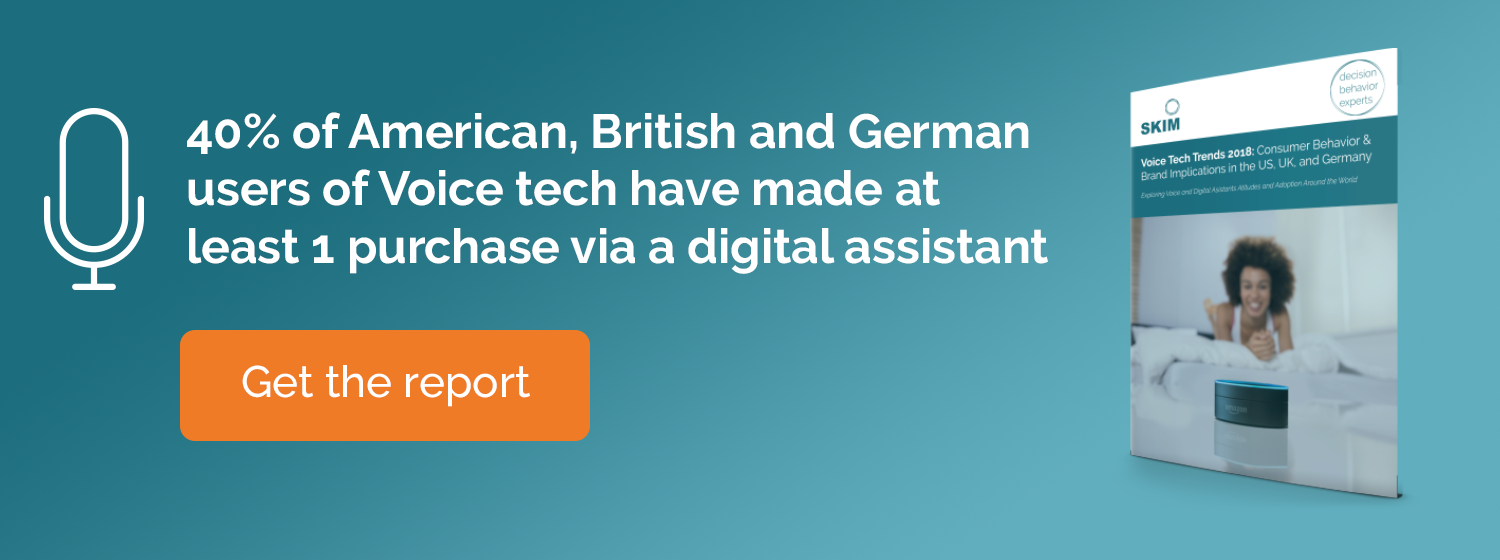Key takeaways on voice and digital assistants from ESOMAR Congress 2018
Artificial Intelligence, voice and digital assistants were all the buzz at ESOMAR Congress 2018. The promise is that when these technologies come together in digital personal assistants, they’ll make our lives easier, remove our “choice stress” and will become our trusted advisors. Sign me up! But, how will voice technology affect consumer behavior and how will brands tackle this new decision environment?
Our recent voice trends research included qualitative interviews with digital and eCommerce experts on this very topic. At ESOMAR, some of these respondents participated in our “Brands on Fire – How to adapt to the new market reality of AI platforms” panel. Danone, Wehkamp, Beiersdorf, Ericsson and SKIM had a lively discussion on the digital implications of AI for brands, marketers and insight professionals. I, along with Yasemin Ozdemir, had the honor to moderate the panel. Here’s what you missed and need to know.
“Do you think Digital Assistants mark the end of marketing as we know it”?
Digital assistants increasingly help us to manage our lives. They’ll learn our interests, be aware of what we have been listening to, watching and researching, assimilate all of our digital interactions and make product choices for us or suggestions to us. “This”, said Michael Björn, Head of Research, Ericsson ConsumerLab, “will totally change marketing, because [marketers will] need to treat the digital assistant as a customer, even though the recipient is a human.”
Brands will need to reinforce consumer loyalty and forge new direct relationships in order to influence purchasing behavior. Dirk Ploss, Digital Technologies Scouting and Advisory for Beiersdorf shared some of what the international skin care company is doing with voice and AI. “We have to educate the consumer to ask for Nivea and not skin care cream…and we have to market to the machine in order to get to the number one spot or number two spot when the machine gives its suggestions of what to buy,” said Ploss.
SKIM recently conducted research in Germany, US, and UK looking at the impact of these new technologies. Joris Huisman, Managing Director of SKIM, shared that 40% have already trialed making a purchase via voice and 38% have are planning to purchase that way within the next six months. “I’ve not seen consumer trust so high with an appetite to use it while it is still in its earliest stage of development,” commented Huisman. “And our research shows young families are leading in the use of voice, so without a doubt, this technology is going mainstream,” he added.

Decoding the complicated layers of Voice and AI technology
Rather than focus on the technology, the panelists agreed that the focus should be on putting the consumer first – specifically understanding what they want from these digital helpers. Anh Mai Vu, Global eCommerce Director, of Danone believes “if brands want to be successful, they need to give good advice to their consumers and not overly push their products.” She said, “brands need to move from being brand centric, talking about our products, to things that are important to our consumers.”
In an earlier session on voice and consumer usage, Joris spoke about the importance of brands creating a direct-to-consumer business to stay ahead with AI. As challenging as it is, Dirk Ploss of Beiersdorf agreed. He said that creating a direct-to-consumer channel “is one of the most important tasks that we have as brands now. At Beiersdorf we are building those experiences to establish the connection with the consumer, to gather data, to learn more and gather more consumer insights, which will be useful for all other channels as well.”
That’s not to say that retailers will be left in the dust. Piet Coelewij, CEO of Wehkamp, the largest eCommerce retailer in the Netherlands, thinks there will be a lot of collaboration between brands and retailers, who in the end, all want to make the customer happy, “because a happy customer is a loyal customer.” For example, Coelewij shared “we have partnership with Philips and with P&G, where we are developing a type of category management to better understand what customers want so we can fulfill that.”
Expert advice for succeeding in with AI, voice and digital assistants today
So, the future is more complex, yes, but it will also create a new world of opportunity. Here are the final pieces of advice the digital experts shared with the audience in Berlin:
- Anh Mai Vu of Danone advised to “be obsessed with shopper data and linking it to human beings. Not only their shopper behavior, but what they are looking for. If you are the first to get that, you can test and learn.”
- “Don’t be intimidated by it [artificial intelligence],” said Piet Coelewij of Wehkamp. “The essence of the technology is not that complicated, “so get on with it, use it and learn as fast as you can.”
- Dirk Ploss of Beiersdorf recommended brands “be prepared as AI will have a major impact on everything we do today, and we will do tomorrow.” He added, “we are moving on an exponential curve. Think about the future, when you cannot do what you do today anymore.”
- Michael Björn of Ericsson ConsumerLab told attendees to “start to differentiate between the purchaser and the consumer.” He pronounced “the purchaser will be a machine; the consumer will be human.”
- According to Joris Huisman of SKIM, brands should “double down on your investments on researching the voice experience and take advantage of the existing channel in your marketing.” He offered radio advertising examples in the US that encouraged consumers to “Ask Alexa about… or ask Google Home for” specific products.
Want to explore how AI is changing the decision environment for your consumers? Please drop us a line and we can discuss how insights can help you navigate this new area.


